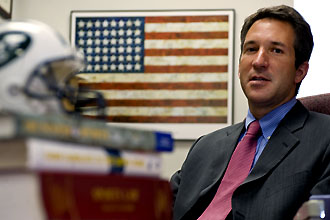Will NFL Players Drop the Bomb?
With National Football League labor negotiations grinding toward an offseason confrontation in March 2011 and an owner lockout becoming a real possibility for the following season, NFL players on four teams, including those on the New Orleans Saints, went on the offensive last week by voting to decertify the players union.

Money is at the heart of the issue between National Football League players and owners, says Gabe Feldman, director of the Sports Law Program at Tulane Law School. (Photo by Paula Burch-Celentano)
“In a way, decertification is the players' version of a nuclear weapon. It is incredibly powerful, very risky and comes with the chance of a lot of collateral damage,” says Gabe Feldman, an associate professor of law and director of the Sports Law Program at Tulane Law School.
Players on other teams are likely to follow in voting for decertification, but probably will pull the trigger on disbanding the NFL Players Association only as a last resort, says Feldman.
Stripping the union of its power to bargain during the middle of tough labor negotiations may seem counterintuitive, but it's a strategy that would allow players to sue the NFL for antitrust violations.
“There is a non-statutory labor exemption, which says that any terms of a collective bargaining agreement including salary cap and revenue sharing are immunized from attack under the antitrust laws,” says Feldman.
If negotiations break down and the players face an imminent lockout, they could “decertify, end the collective bargaining relationship and bring an antirust suit challenging all the rules the NFL has in place,” says Feldman. But in doing so, players risk losing not only their collective bargaining power but also health and pension benefits provided by the union.
The impasse between the players union and owners began two years ago when the owners voted to opt out of the current collective bargaining agreement at the end of the 2010 season.
Not surprisingly, says Feldman, at the heart of the issue is money.
“The basic argument is that in the last round of negotiations the owners gave up too much to the players,” he says.
Under the current collective bargaining agreement, players receive 59.6 percent of the NFL's total revenue, which last year was estimated at $9 billion.
